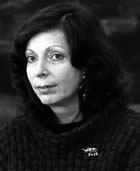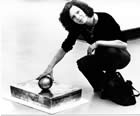Fembio Specials Famous Women from Hanover, Germany Katrin Sello
Fembio Special: Famous Women from Hanover, Germany
Katrin Sello

born on December 8, 1941 in Berlin
died on January 20, 1992 in Hannover
German art historian, critic and curator of exhibitions; director of the Kunstverein Hannover from 1976–1989
Biography • Quotes • Literature & Sources
Biography
 Katrin Sello, a committed and unconventional curator of art exhibitions, set new standards in art and had in her 13 years as the director of the Kunstverein Hannover a formative influence on Lower Saxony's art scene. Those who knew her were impressed not only by her personality, her brilliant intellect, and her sound knowledge of art history, theater and literature, but also by her ability to present the most difficult topics with utmost precision.
Katrin Sello, a committed and unconventional curator of art exhibitions, set new standards in art and had in her 13 years as the director of the Kunstverein Hannover a formative influence on Lower Saxony's art scene. Those who knew her were impressed not only by her personality, her brilliant intellect, and her sound knowledge of art history, theater and literature, but also by her ability to present the most difficult topics with utmost precision.
For the daughter of the photographer and journalist Ingeborg Sello and the well-known art critic Gottfried Sello, encounters with art and artists were commonplace from childhood onward. Katrin Sello wrote that she was “born into the light of a Prussian winter” in Berlin in 1941. After World War II she and her family moved to Hamburg. She attended university in Munich and Hamburg, transferring in 1964 to Berlin to continue her study of art history, German, theater and philosophy.
Here she became an ardent political activist, and by the time she was appointed director of the Kunstverein Hannover Sello was known as “the red Katrin.” As early as 1965, while still a student in Berlin, she began working as a freelance art critic for local and West German newspapers, above all for Die Zeit and the Tagesspiegel. In addition to art reviews, she also wrote literature, theater and film reviews for RIAS and Sender Freies Berlin. Moreover, she devoted herself to studying the work of art critic Carl Einstein and wrote numerous essays on art theory.
In 1969 Katrin Sello co-founded the “Berliner Neue Gesellschaft für Bildende Kunst” (New Berlin Society for Fine Arts), which offered a politically engaged concept of art as an alternative to the dusty traditions of established museums and art associations. Here she made a substantial contribution to the organization and content of numerous exhibitions (e.g. “John Heartfield,” “Constantin Meunier,” “Paris Commune 1871,” “Renato Guttuso”).
In 1976, having made a name for herself in Berlin as an exhibition organizer, she became director of the Kunstverein Hannover, the first—and thus far only—woman to hold this post since the organization was founded in 1832.
Although the initial years were hard—due to insufficient financial support and a mountain of “inherited” debt—Katrin Sello succeeded in lending the Kunstverein a new image and making it known nationwide with original and impressive thematic exhibitions. She devised wonderful exhibitions such as Backbilder (Baking Images; 1976), Nachbilder (After-images; 1979), and Spiegelbilder (Mirror Images; 1982) as well as Zwischen Plastik und Malerei (Between Sculpture and Painting; 1984). Androgyn (Androgynous; 1987) and Pierre Alechinsky (1988) also aroused considerable attention.
Her work as a curator of exhibitions was influenced by her political commitment and by the great subjects of art—she had the courage to experiment and to leave the beaten path. She was primarily interested in systematically investigating the correlations and conflicts between art and society.
In the Kunstverein she provided a venue for new directions in contemporary art that were not yet widely accepted and could provoke both enthusiasm and opposition. Sello was an outspoken woman in a society largely controlled by men, and she consistently took a stand and justified it with sound knowledge and well-founded political and cultural argumentation. She was often prepared to take risks in the process. In 1981, for example, she provided a public forum for the psychologist Peter Brückner, who had been dismissed from the University of Hannover because of his leftist views.
For Katrin Sello, the Kunstverein was not only a place for presenting fine art. Her goal was to bring together the different intellectual disciplines, to make the Kunstverein a center for aesthetic, scientific and political discourse. In this spirit she initiated a variety of literary, cinematic and musical events to accompany the individual exhibitions. She loved the absurd, never gave in to the dictates of the zeitgeist, and was challenging and demanding in discussion, where her reserve concealed her sensitivity and vulnerability.
She continued to attract interesting personalities to Hannover, for instance the author Herta Müller, the composer Patricia Jünger, and the film-maker Valie Export—all for the Dialogue of the Arts in 1989. Despite having been diagnosed with multiple sclerosis in 1979, her warrior-like spirit and energy turned the Kunstverein into a place for intellectual exchange of the highest order.
One of her interests was the work of women artists, as seen in her exhibitions of works by Frida Kahlo and Tina Modotti, Maria Lassnig, Marianne Werefkin, and the feminist artist Miriam Cahn. Katrin Sello organized a total of over 70 exhibitions in Hannover, including the first German retrospective of works by the great Belgian Expressionist Constant Permeke. She initiated the “Villa Minimo” grant for young artists from Lower Saxony and organized the annual fall exhibition and forum for talented young artists from throughout Germany.
 In 1985 Katrin Sello was diagnosed with another incurable illness. She gave up her position as director of the Kunstverein in 1990, but not solely for health reasons: she savored her freedom, blossomed emotionally, and “loved [her] everyday life for the first time.” She did not live to see the publication of her first book of poetry, Antilope wollte ich sein zur Nacht (At night I wanted to be an antelope), at the end of 1992. On January 20, 1992, just weeks after her fiftieth birthday, Katrin Sello died of cancer.
In 1985 Katrin Sello was diagnosed with another incurable illness. She gave up her position as director of the Kunstverein in 1990, but not solely for health reasons: she savored her freedom, blossomed emotionally, and “loved [her] everyday life for the first time.” She did not live to see the publication of her first book of poetry, Antilope wollte ich sein zur Nacht (At night I wanted to be an antelope), at the end of 1992. On January 20, 1992, just weeks after her fiftieth birthday, Katrin Sello died of cancer.
In 2001 the City of Hannover named a street after Katrin Sello, honoring her “because she contributed decisively to the city's image as Lower Saxony's center of contemporary art.” Katrin Sello Road is in Hannover's new district of Badenstedt West.
(translated by Rebecca van Dyck and Joey Horsley)
Author: Marietta Stein
Quotes
You, my feet, no longer want to carry me? Very well, then we will have to fly, she, my soul, and I. ... Remember and take me between your wings, so that we have to shun the mirrors no more. I am splendid in flight, a spring wind is storming. We will dance without feet. — Katrin Sello (from “An einem grauen Sonntag im April” (On a gray Sunday in April), dedicated to Frida Kahlo)
Her trademark: reserved subjectivity, precise knowledge of the 'big' scene, and amiable cultivation of regional art.…The initial years in the Kunstverein were hard.… Katrin Sello's great achievement at the beginning was that she got it back on its feet; she knew how to budget economically, and yet she still lent the Kunstverein a new image. (Siegfried Barth in his obituary in the Neue Presse, Hannover, January 23, 1992)
Literature & Sources
Barth, Siegfried. 1992. “Schlingerndes Kunst-Schiff wieder flottgemacht: Katrin Sello starb mit 50 Jahren”, Neue Presse Hannover, 23.1.1992
Einstein, Carl. 1973. Die Fabrikation der Fiktionen. Gesammelte Werke in Einzelausgaben. Hamburg (Rowohlt) 1973. Hrsg. von Sibylle Penkert. Eingeleitet von Helmut Heißenbüttel. Mit Beiträgen von Sibylle Penkert und Katrin Sello. (das neue buch 17)
Nachbilder: Vom Nutzen uund Nachteil des Zitierens für die Kunst; Kunstverein Hannover, 10. Juni - 29. Juli 1979. Katalog Gerhard Ahrens und Katrin Sello. Hannover 1979. Kunstverein.
Petra Rosenthal: Bilder 1985 - 1987; Kunstverein Hannover, 7. Mai - 26. Juni 1988. Redaktion: Katrin Sello. Hannover 1988. Kunstverein.
Sello, Katrin. 1970. “Revolte und Revolution: Vorschläge zu einer Interpretation des 'Bebuquin'”,in: alternative (Zeitschrift für Literatur und Diskussion), 13. Jg. (1970), S. 232 -245
Sello, Katrin. 1992. Antilope wollte ich sein zur Nacht: Nichtprosa. Hamburg. Christians Verlag. Bestellung über Tel/Fax 030-883 7832.
Spiegelbilder: Kunstverein Hannover, 9. Mai - 30. Juni 1982 [150 Jahre Kunstverein Hannover]. Redaktion Katrin Sello. Berlin 1982. Frölich & Kaufmann.
Wat den een sien Uhl is den annern sien Nachtigall: Kunstverein Hannover, 4. Oktober - 8. November 1981 / 68. Herbstausstellung Niedersächsischer Künstler. Redaktion Katrin Sello. Hannover 1981. Kunstverein.
Zwischen Kunst und Psychiatrie: Siegfried Neuenhausens Bildhauerprojekte mit Patienten in Wunstorf und Ochsenzoll; 13. Februar - 4. April 1983, Kunstverein Hannover. Katalog Siegfried Neuenhausen und Katrin Sello. Hannover 1983. Kunstverein.
If you hold the rights to one or more of the images on this page and object to its/their appearance here, please contact Fembio.


